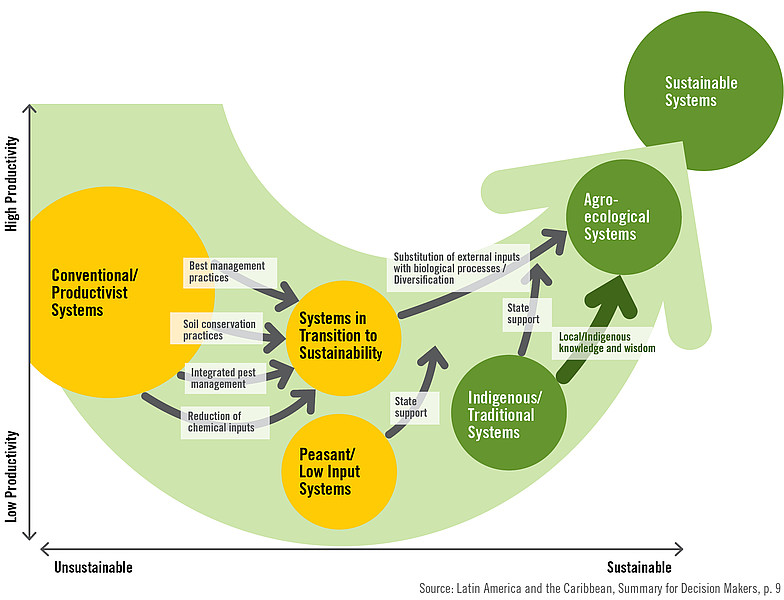Agroecology And Agrobiodiversity Conservation
Agroecology is an approach to agriculture that focuses on sustainable and ecological practices. It emphasizes the importance of working with nature rather than against it, promoting biodiversity, and using natural resources efficiently. This article explores the concept of agroecology, its benefits, and potential recommendations for its adoption.
Agroecology is gaining popularity worldwide as a viable alternative to conventional agricultural practices. Its holistic and regenerative nature offers numerous advantages, including improved soil health, increased crop resilience, and enhanced ecosystem services. By adopting agroecological principles, farmers can reduce their reliance on synthetic pesticides and fertilizers, leading to healthier food production systems and a more sustainable agricultural sector.
What is Agroecology?
Agroecology is the study of ecological processes that are relevant to agricultural systems. It seeks to understand the interactions between plants, animals, humans, and their environment within agricultural landscapes. By analyzing these relationships, agroecologists aim to develop sustainable farming methods that are both economically viable and environmentally friendly.
Ideas For Implementing Agroecology:
1. Crop Diversification: Incorporating a wide variety of crops in agricultural fields promotes biodiversity, reduces pests and diseases, and enhances soil fertility. Crop diversification can also improve farm resilience to climate change and market fluctuations.
2. Agroforestry: Integrating trees with agricultural crops or pastures provides multiple benefits. Trees provide shade, reduce erosion, and enhance soil fertility while diversifying income streams for farmers through timber and fruit production.
3. Conservation Agriculture: Adopting farming practices such as minimal soil disturbance, permanent soil cover, and crop rotation improves soil health, reduces water consumption, and minimizes soil erosion. Conservation agriculture also promotes carbon sequestration and climate change mitigation.
4. Water Management: Efficient water use in agriculture is crucial for sustainable food production. Implementing techniques like drip irrigation, rainwater harvesting, and conservation practices can optimize water resources while reducing water pollution and depletion.
5. Livestock Integration: Combining livestock and crop production systems can create symbiotic relationships that improve soil fertility, nutrient cycling, and overall farm productivity. Livestock can also contribute to diversifying farmers' income streams.
Recommendations For Adopting Agroecology:
1. Knowledge Sharing: Governments, research institutions, and non-governmental organizations should facilitate the exchange of information and experiences among farmers, researchers, and agroecology practitioners. This will contribute to the widespread adoption of agroecological practices.
2. Policy Support: Governments should develop policies that incentivize agroecological practices, provide financial support, and implement regulations that encourage sustainable agriculture. This can be done through subsidies, tax incentives, and the inclusion of agroecology in national agricultural strategies.
3. Capacity Building: Educational programs and training workshops should be conducted to enhance farmers' knowledge and skills in agroecology. This will empower farmers to transition from conventional to agroecological practices and overcome challenges associated with the transition.
4. Research and Development: Continued investment in research and development is essential to further understanding the science behind agroecology, develop innovative farming technologies, and address emerging challenges. Funding should be directed towards long-term agroecological research projects.
5. Market Access: Governments and stakeholders should work towards creating markets that value and promote sustainable agricultural products. This can be achieved through certification schemes, labeling initiatives, and support for local and organic food movements.
Listicle of Benefits of Agroecology:
- Improved Soil Health: Agroecological practices promote the enhancement of soil fertility, organic matter content, and overall soil health.
- Biodiversity Preservation: Agroecology prioritizes biodiversity conservation, leading to an increase in beneficial organisms and ecological balance within agricultural ecosystems.
- Water Conservation: By optimizing water use and reducing water pollution, agroecology contributes to sustainable water management.
- Climate Change Mitigation: Agroecological approaches help sequester carbon in soils, contributing to climate change mitigation efforts.
- Enhanced Food Security: Agroecology prioritizes the production of diverse and nutritious crops, ensuring food availability and accessibility for communities.
- Resilience to Climate Change: Agroecology builds resilient farming systems that can withstand extreme weather events and changing climatic conditions.
- Reduced Chemical Inputs: Agroecology minimizes the use of synthetic pesticides and fertilizers, resulting in healthier food production systems and reduced environmental pollution.
- Strengthened Rural Economies: By promoting sustainable farming practices, agroecology can contribute to increased income and employment opportunities in rural areas.
- Improved Human Health: Agroecology prioritizes the production of organic and nutritious food, leading to improved human health outcomes and reduced exposure to harmful chemicals.
- Promotion of Social Equity: Agroecology emphasizes inclusive and participatory approaches, ensuring equitable access to land, resources, and decision-making processes in agriculture.
Question & Answer:
Q: How does agroecology benefit small-scale farmers?
A: Agroecology provides small-scale farmers with sustainable farming techniques that can improve crop yields, reduce input costs, and enhance their resilience to climate shocks.
Q: Can agroecology contribute to rural development?
A: Yes, agroecology promotes the strengthening of rural economies by creating additional income opportunities, preserving natural resources, and enhancing social cohesion within communities.
Q: What are the challenges associated with adopting agroecology?
A: Some challenges include limited access to knowledge and training, initial investment costs, and resistance to change from farmers accustomed to conventional practices.
Summary of Agroecology:
Agroecology offers a sustainable and environmentally friendly approach to agriculture. By implementing practices such as crop diversification, agroforestry, and conservation agriculture, farmers can improve soil health, enhance biodiversity, and mitigate climate change impacts. Adopting agroecological principles requires knowledge sharing, policy support, capacity building, and market access. The numerous benefits of agroecology range from improved soil fertility and water management to enhanced food security and rural development. Despite challenges, agroecology presents a promising pathway towards a more sustainable and resilient agricultural system.
References:
- Global Agriculture. (n.d.). [Image]. Retrieved from https:\/\/www.globalagriculture.org\/fileadmin\/_processed_\/csm_Transitionwithouttitle_01_0efce080a6.jpg

Post a Comment for "Agroecology And Agrobiodiversity Conservation"